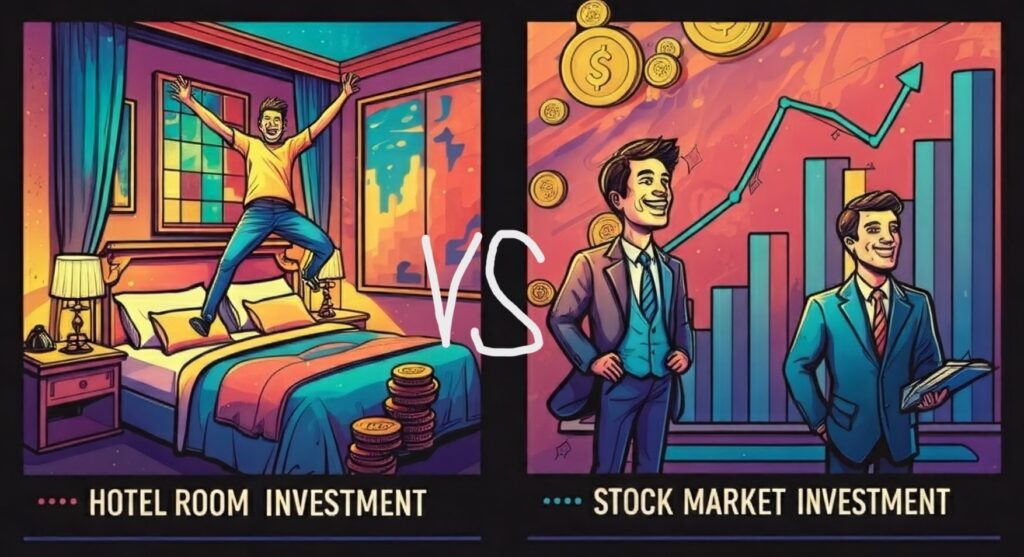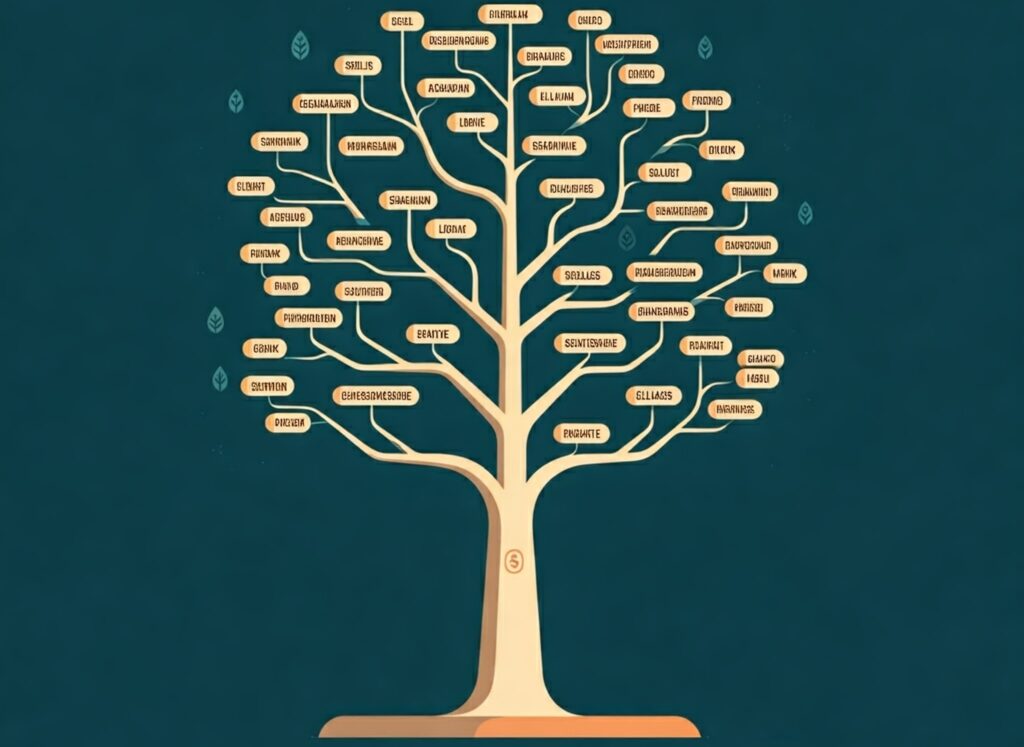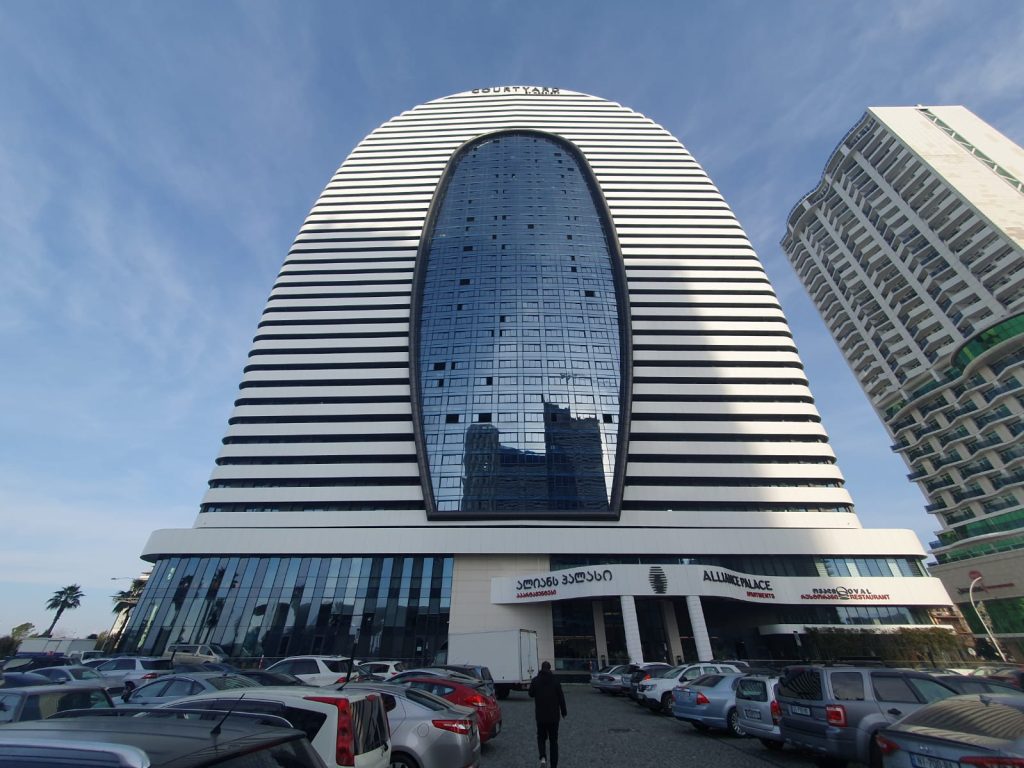Beyond the Usual: Exploring Unconventional Investment Avenues
The world of investment is vast and varied, extending far beyond the familiar territory of stocks and bonds. For those seeking to diversify their portfolios and explore unconventional avenues, hotel room investment presents a compelling alternative. This unique approach to real estate allows individuals to own a slice of a thriving hospitality business, offering a distinctive set of advantages and challenges compared to traditional stock market investments.
Hotel Rooms vs. Stocks: An Unexpected Showdown
In this comparative analysis, we’ll delve into the intricacies of hotel room investment, juxtaposing it with the well-trodden path of stock market participation. By examining the nuances of each, we aim to illuminate their respective strengths and weaknesses, empowering you to make informed decisions aligned with your financial goals and risk tolerance.
| Investment Type | Upsides | Downsides |
|---|---|---|
| Stock Market | High Growth Potential | Volatility |
| Liquidity | Market Risk | |
| Diversification Opportunities | Requires Research and Knowledge | |
| Hotel Room | Steady Income | Limited Appreciation |
| Hassle-Free Management | Dependence on Tourism | |
| Tangible Asset | Potential Management Issues |
Understanding Hotel Room Investment
Not Your Typical Rental: Delving into the World of Hotel Room Ownership
Hotel room investment diverges from traditional real estate models. Instead of acquiring an entire property, investors purchase individual rooms or fractional ownership within a hotel. This approach grants access to the hospitality sector without the burdens of property management, offering a unique blend of ownership and passive income generation.
How it Works: Fractional Ownership and its Perks
Fractional ownership allows multiple investors to collectively own a hotel room or suite. This model reduces the financial barrier to entry, making hotel room investment accessible to a wider range of individuals. Moreover, it offers the advantage of professional management, with the hotel operator handling day-to-day operations, marketing, and guest services.
Profit Potential: Decoding the Revenue Streams
Hotel room investments generate income through a share of the room’s rental revenue. This revenue stream is influenced by factors such as occupancy rates, room rates, and operating expenses. Investors typically receive regular payouts, often on a monthly or quarterly basis, providing a predictable income stream.

Understanding Stock Market Investment
Stocks 101: A Primer for the Uninitiated
The stock market represents a collection of exchanges where publicly traded companies’ shares are bought and sold. Investing in stocks grants individuals partial ownership of these companies, with the potential to profit from their growth and success.
The Allure of the Market: Growth Potential and Liquidity
The stock market’s allure lies in its potential for high returns. Successful companies can experience significant growth, leading to substantial appreciation in their stock value. Moreover, the stock market offers high liquidity, allowing investors to quickly buy and sell shares, providing flexibility and access to capital.
Navigating the Risks: Volatility and Market Fluctuations
Stock market investments are inherently volatile. Share prices can fluctuate dramatically in response to economic conditions, company performance, and investor sentiment. This volatility introduces an element of risk, with the potential for both gains and losses.
Direct Comparison: Hotel Rooms vs. Stocks
Stability vs. Volatility: Comparing Risk Profiles
Hotel room investments generally offer greater stability compared to the inherent volatility of the stock market. While hotel revenues can fluctuate seasonally, they are less susceptible to the dramatic swings that characterize stock prices. This stability makes hotel room investment appealing to those with a lower risk tolerance.

Passive Income vs. Active Trading: Effort and Engagement
Hotel room investments provide a truly passive income stream. Once the investment is made, the hotel management handles all operational aspects, requiring minimal effort from the investor. In contrast, stock market investment can range from passive index fund investing to active trading, requiring varying levels of research, monitoring, and engagement.
Tangible Asset vs. Intangible Ownership: The Psychology of Investment
Investing in a hotel room provides the psychological comfort of owning a tangible asset – a physical space within a real estate development. This tangibility contrasts with the intangible nature of stock ownership, which represents a share in a company’s performance rather than a physical asset.
Inflation Hedge: Which Investment Holds its Value Better?
Both hotel room investments and stock market investments can act as hedges against inflation. Real estate values tend to rise with inflation, and hotel room rates can be adjusted accordingly. Similarly, companies can often pass on increased costs to consumers, potentially leading to stock price appreciation during inflationary periods.
Tax Implications: Unveiling the Tax Advantages and Disadvantages
The tax implications of hotel room investment and stock market investment vary depending on the jurisdiction and specific investment structure. Hotel room investors may benefit from deductions related to property ownership, while stock market investors may face capital gains taxes on profits. Consulting with a tax advisor is crucial to understand the specific tax implications of each investment option.
Pros and Cons of Hotel Room Investment
The Upsides: Steady Income, Hassle-Free Management, Tangible Asset
- Steady Income: Hotel room investments generate a predictable income stream through rental revenue sharing.
- Hassle-Free Management: The hotel operator handles all aspects of property management, relieving investors of landlord responsibilities.
- Tangible Asset: Investors own a physical asset, providing a sense of security and stability.
The Downsides: Limited Appreciation, Dependence on Tourism, Potential Management Issues
- Limited Appreciation: Hotel room appreciation may be limited compared to other forms of real estate.
- Dependence on Tourism: Revenue is dependent on tourism and occupancy rates, which can be affected by economic downturns and external factors.
- Potential Management Issues: Investors rely on the hotel management company for effective operations and revenue generation.
Pros and Cons of Stock Market Investment
The Upsides: High Growth Potential, Liquidity, Diversification Opportunities
- High Growth Potential: Stocks offer the potential for significant capital appreciation through company growth and market expansion.
- Liquidity: The stock market provides high liquidity, allowing investors to quickly buy and sell shares.
- Diversification Opportunities: Investors can diversify their portfolios across various sectors and industries, reducing risk.
The Downsides: Volatility, Market Risk, Requires Research and Knowledge
- Volatility: Stock prices are subject to significant fluctuations, introducing an element of risk.
- Market Risk: External factors and economic downturns can negatively impact stock market performance.
- Requires Research and Knowledge: Successful stock market investing requires research, analysis, and understanding of market dynamics.
Factors to Consider When Choosing
Risk Tolerance: Playing it Safe vs. Embracing the Thrill
Your risk tolerance plays a crucial role in determining the suitability of hotel room investment vs. stock market investment. If you prefer stability and predictability, hotel rooms may be a better fit. If you’re comfortable with volatility and seeking higher growth potential, the stock market may be more aligned with your risk appetite.
Investment Goals: Short-Term Gains vs. Long-Term Growth
Consider your investment goals and time horizon. Hotel room investments typically provide a steady income stream, making them suitable for those seeking passive income and long-term stability. Stock market investments, while volatile, offer the potential for higher growth over the long term, making them suitable for those with a longer investment horizon and growth-oriented objectives.
Financial Capacity: Capital Requirements and Investment Horizon
Assess your financial capacity and investment horizon. Hotel room investments typically require a significant upfront capital outlay, while stock market investments can be started with smaller amounts. Consider your available funds and the timeframe for which you plan to invest.
Personal Preferences: Hands-On vs. Hands-Off Approach
Determine your preferred level of involvement. Hotel room investments offer a hands-off approach, with the hotel management handling day-to-day operations. Stock market investments can range from passive to active, requiring varying levels of research, monitoring, and trading activity.
Diversification: The Key to a Balanced Portfolio
Why Diversification Matters: Spreading the Risk
Diversification is a fundamental principle of sound investing. By spreading your investments across different asset classes, you reduce the impact of any single investment’s performance on your overall portfolio. Diversification helps mitigate risk and enhance long-term stability.
Combining Hotel Rooms and Stocks: A Synergistic Approach
Combining hotel room investments and stock market investments can create a synergistic approach to portfolio diversification. The stability of hotel room income can balance the volatility of stock market investments, creating a more balanced and resilient portfolio.

Case Studies: Real-World Examples
Success Stories: Hotel Room Investments That Outperformed the Market
The Riviera Retreat – A Coastal Hotel Room Investment Success Story (some details changed to protect privacy)
This case study examines the investment journey of Sarah, a seasoned investor who opted to diversify her portfolio by purchasing a hotel room at the Riviera Retreat, a newly built beachfront resort in a popular tourist destination.
Investment Details:
- Property: A deluxe ocean-view room at the Riviera Retreat, a 4-star hotel with upscale amenities and a prime location.
- Investment Model: Fractional ownership with a reputable hotel management company.
- Purchase Price: $200,000 for a 1/10th share of the room.
- Financing: 60% LTV mortgage with a 5% interest rate.
Investment Strategy:
Sarah was attracted to the Riviera Retreat due to its prime location, strong tourism market, and the projected high occupancy rates. She opted for fractional ownership to lower the investment barrier and benefit from professional management, allowing for a truly passive income stream.
Revenue Generation:
The hotel management company implemented a revenue-sharing model, distributing 50% of the room’s net rental income to the investors. Sarah received monthly payouts, which varied seasonally but consistently exceeded her initial projections.
Key Performance Indicators:
- Average Occupancy Rate: 85% throughout the year, exceeding the initial projections of 75%.
- Average Daily Rate (ADR): $350, exceeding the initial projections of $300.
- Net Operating Income (NOI): Consistently surpassed projections due to efficient cost management by the hotel operator.
Return on Investment:
Within the first year, Sarah’s investment generated an annualized return of 12%, significantly outperforming her stock portfolio during the same period. This strong performance was attributed to the high occupancy rates, premium pricing, and efficient management of the Riviera Retreat.
Challenges and Mitigation:
- Seasonality: While occupancy remained high throughout the year, there was a noticeable dip during the shoulder seasons. The hotel management company mitigated this by offering attractive packages and promotions to attract off-season guests.
- Unexpected Repairs: A minor plumbing issue required unexpected repairs, temporarily impacting the room’s availability. The fractional ownership model ensured that the repair costs were shared amongst the investors, minimizing Sarah’s individual financial burden.
Long-Term Outlook:
Sarah’s investment in the Riviera Retreat has proven to be a successful addition to her portfolio. The property’s strong performance, coupled with the projected growth in tourism, indicates a positive long-term outlook for continued revenue generation and potential appreciation of her fractional ownership share.
Conclusion:
Sarah’s case study exemplifies the potential of hotel room investment as a viable alternative to traditional investments. By carefully selecting a property with a strong market position, partnering with a reputable management company, and understanding the dynamics of the hospitality industry, investors can achieve attractive returns and diversify their portfolios with a tangible asset in a thriving sector.
Cautionary Tales: Stock Market Investments Gone Wrong
1. Black Monday (1987): A Day of Unprecedented Decline
On October 19, 1987, the Dow Jones Industrial Average plummeted a record-breaking 22.6% in a single day. This event, now infamously known as “Black Monday,” sent shockwaves through global markets. There was no single cause, but contributing factors included concerns about overvalued stocks, rising interest rates, and the burgeoning use of program trading, which automatically triggered sell orders as prices fell, exacerbating the decline. This dramatic plunge demonstrated the vulnerability of the stock market to sudden shifts in investor sentiment and the potential for cascading effects fueled by automated trading systems.
2. Dot Com Bubble Burst (2000-2002): The Demise of Internet Euphoria
The late 1990s witnessed an unprecedented surge in internet-based companies, fueled by speculative investments and exuberant optimism about the transformative power of the internet. However, this “dot com bubble” burst spectacularly in the early 2000s. Many internet companies, lacking viable business models and driven by hype rather than fundamentals, collapsed. The Nasdaq Composite Index, heavily weighted towards technology stocks, plummeted nearly 80% from its peak in March 2000 to its trough in October 2002. This crash underscored the dangers of speculative bubbles and the importance of fundamental analysis in investment decisions.
3. The Subprime Mortgage Crisis (2008-2009): A House of Cards Collapses
The subprime mortgage crisis, triggered by the collapse of the U.S. housing market, led to a global financial crisis in 2008-2009. Years of lax lending practices and the proliferation of complex mortgage-backed securities had created a fragile financial system built on a foundation of risky loans. As housing prices began to decline, defaults on subprime mortgages surged, leading to a cascade of losses throughout the financial system. The Dow Jones Industrial Average fell over 50% from its peak in October 2007 to its trough in March 2009, marking one of the most severe bear markets in history. This crisis highlighted the interconnectedness of global financial markets and the devastating consequences of systemic risk.
These examples demonstrate the inherent volatility of the stock market and its susceptibility to both exuberance and panic. While the stock market offers the potential for high returns, it’s crucial to recognize the risks involved and approach investments with a long-term perspective and a well-diversified portfolio.
Expert Opinions: Insights from Seasoned Investors
What the Experts Say: Weighing the Pros and Cons of Each Option
“Real estate, in its essence, represents a tangible manifestation of value. With a hotel room, you’re not merely investing in a company’s performance; you’re acquiring a physical space in a real-world asset.” – Margaret Olsen, Real Estate Investment Strategist
This quote highlights the psychological comfort and sense of security associated with owning a tangible asset, a key differentiator for those who prefer the concreteness of real estate over the abstract nature of stock ownership.
“The beauty of hotel room investment lies in its passive income generation. The hotel management takes care of the operational intricacies, allowing investors to reap the rewards without the landlord’s typical burdens.” – David Chen, Financial Advisor and Portfolio Manager
This insight emphasizes the hands-off nature of hotel room investment, a major draw for those seeking a hassle-free approach to generating passive income.
“While hotel room investments may offer stability, remember that the stock market’s growth potential remains unparalleled. For those with a longer time horizon and a higher risk appetite, equities can provide exponential returns that real estate often struggles to match.” – Alex Rodriguez, Venture Capitalist and Angel Investor
This perspective underscores the importance of aligning investment choices with individual risk tolerance and financial goals. While hotel rooms offer stability, the stock market’s potential for high growth remains a compelling factor for investors seeking to maximize returns.
“In the ever-evolving investment landscape, diversification is paramount. Don’t view hotel rooms and stocks as mutually exclusive; consider them complementary pieces of a well-balanced portfolio.” – Maria Garcia, Certified Financial Planner
This advice emphasizes the importance of diversification in mitigating risk and building a resilient portfolio. Combining the stability of hotel room investments with the growth potential of stocks can create a synergistic approach to wealth building.
“The future of investment lies in understanding the convergence of real estate and technology. Savvy investors will leverage Proptech platforms to analyze hotel performance data, optimize revenue streams, and gain a competitive edge in the hospitality sector.” – John Lee, Tech Entrepreneur and Real Estate Investor
This forward-looking perspective highlights the growing influence of technology on real estate investment. By embracing Proptech, investors can make data-driven decisions and unlock new levels of efficiency and profitability in their hotel room investments.
The Future of Hotel Room Investment and the Stock Market
Emerging Trends: Technology and the Evolving Landscape of Investment
Technology is transforming both the hospitality industry and the stock market. Online platforms are facilitating hotel room investments, while fintech advancements are democratizing access to the stock market. Staying informed about these emerging trends is crucial for making informed investment decisions.
Conclusion
Making the Right Choice: Aligning Your Investment with Your Goals
The choice between hotel room investment and stock market investment ultimately depends on your individual circumstances, financial goals, and risk tolerance. Carefully consider the factors discussed in this analysis to determine which option best aligns with your investment objectives.
The Bottom Line: There’s No One-Size-Fits-All Answer
There’s no universally superior investment option. Both hotel room investment and stock market investment offer unique advantages and disadvantages.
If you are looking for some excellent hotel room investment options contact Larry at +995 577 097 062


